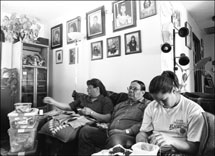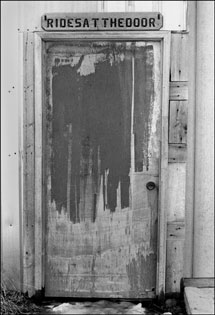 |
||
Richard
Sanderville, one of the first translators of the Blackfeet language,
drew thes names illustrations in the early 1900s. |
||
An
icy spring wind sweeps down the eastern Rocky Mountain front and
whips across the plains of Browning, drifting snow high against
the side of the bright blue home of George Kicking Woman.
Harsh spring conditions are not unusual on this 1.5 million-acre reservation located on the outskirts of Glacier National Park in northern Montana. While much of the country greets the birth of spring, often this reservation is still gripped by winter’s icy grasp. The severe temperatures and winds equal the bounty of the region’s beauty and as long as human history has been recorded here, the weather dictates how many events unfold. The winter of 1911-1912 was no exception, when George Kicking Woman was born in a remote area north of Browning. "My mother and father lived up in the woods," George says. "The snow was that deep," he explains as he holds his hand 3 feet from the floor. It was in November, well after a brutal winter had tightened its grip. But it wasn't until April that his parents were able—or saw the need—to head to town and officially record his birth with the Bureau of Indian Affairs. George's parents spoke Blackfeet and very little English. They told the agent their new baby's name, a Blackfeet name that means Ran Down. Many sounds in the Blackfeet language cannot be depicted in English letters, and through some mistake, their baby was given another name. George was registered as Kicking Woman, and his Nov. 6 birth date was recorded instead as April 2, 1912. Many Indian names came to be in just that way. Earl Old Person, the contemporary chief of the Blackfeet tribe, was supposed to have the name Woman Shoe. Even the names of the tribes were changed by white men. The spellings of the Blackfeet bands within the tribe vary as often as the historians' attempts to record them. Names have always held a sacred place in Blackfeet culture. And though George long ago resigned to accepting his agent-given name, he is a central figure in the naming ceremonies that have long been sacred to the tribe and to Indian families. In Indian custom a ceremonial name signifies more than ancestral identity. A name tells others about the named person’s accomplishments in life or traits that they possess. Each spring, after the first thunderstorm rumbles across the northern plains, George unwraps his Thunder Medicine Pipe Bundle. For decades, George and his wife, Molly, sat and slowly unwrapped the bundle. As each centuries-old-artifact was removed, George would sing the song associated with each one. When George would forget a phrase, Molly would remind him and he would continue. But no longer. Molly died in July 2000 and George is the only one left with the knowledge that his ancestors have been transferring by words for hundreds of years. "Since my old lady left it's been hard," he says, motioning with his hand in a backwards sweep. George grew up speaking Blackfeet and is one of the few elders who know the tribe's sign language as well. His use of hand motions is prevalent when he speaks, adding richness to his words. His hands are gnarled, and the tip of his left index finger is missing from an accident while working on a 1928 Ford pickup. He talks about how much Molly knew about the tribal songs, ceremonies and dances, some of which no one knows now. "She knows more than I do about the Indian way," George says, speaking as if she is with him still. George is concerned about the loss of the language in Indian society and believes that is the cause of many of the problems his people face. His children all understand Blackfeet, as do many of their children. "Our language sounds interesting when you talk," George says. "I wish we didn't have to have interpreters." A good interpreter may have prevented the mistake with the Kicking Woman name, which has been passed down to some of his 110 children, grandchildren and great-grandchildren. But George says it is too late to unravel the error. "It's too late to change," George says. "If I would change my name, look at how much would have to change. Everyone knows me and my kids by that name." As one of the oldest members of the tribe, he is a central figure in the cultural and traditional religion of the Blackfeet. He is a person who people go to for advice, help or food. He says his Social Security card, driver’s license and even his retirement papers from the Great Northern Railroad all bear the name Kicking Woman. But the ceremonial names that he has the authority to give seem more important to George. For a time, he and his wife were the only living persons in the tribe on the Blackfeet Reservation to hold a medicine pipe bundle. Since the Native American Graves Protection and Repatriation Act passed Congress in 1990, bundles that were in non-Indian hands are coming back into tribal possession. Although it has been nearly two years since Molly died from complications from high blood pressure, the heartache is evident on George's face when he speaks about her. It’s equally evident when he talks about the accident in October 1993 that took the life of his youngest son, Leland. George had planned to transfer the authority of his bundle to Leland, but he was killed in a logging accident. It was his first day on the job and the foreman was showing Leland and another man how to fell a tree. When the two men realized that a wind gust had swung the tree in their direction, Leland pushed the other man to safety. But Leland was hit and the spinal cord injuries he suffered resulted in his death nine months later. George’s son Clifford has diabetes and doctors say he will not live to be as old as his father. Clifford says that one of his brothers-in-law will eventually take over the authority and responsibility for the bundle. In the Kicking Woman living room stands a large bookshelf filled with pictures and trophies of family descendants. On the wall behind it are two large pictures of Leland and of Rita, George’s daughter who died from diabetes. George has helped raise most of Leland's six children. Leland's ceremonial name—Long Time Otter—has been passed on to one of George’s grandsons, 3-year-old Kehyn. One of Leland's daughters, 17-year-old Lissa, is still being raised by George and lives with him, as does Kehyn. Her given name is Yellow Star Woman, which came from her grandmother. "He's really a caring person," Lissa says, "and he's always been there for us." George has been a father for many of his extended family members, stepping in when others would not or could not. As Lissa prepares for the birth of her second child, she knows she and her children are in good hands. George says he worries about what will happen to Blackfeet culture and language, but his family's well being is what concerns him most right now. "If you're real close to your kids," George says, "that's the important thing." Rides At The Door Smokey Rides At The Door spent the first 18 years of his life as Smokey Doore. Now he uses both his given name and its shorter version. He says his full name causes difficulties in a world unfamiliar with the rich tradition of Indian names. Computers often shorten it to something awkward and his mail often has a mangled version of his name. While Smokey says it’s not the case in his family, it is not uncommon for some Indian families to have shortened or altered their descriptive last names to avoid the ridicule and racism they say their name so often sparks. Smokey still signs legal documents as Doore, so the English name remains with him today. But the family name Rides At The Door has an origin generations of his family continue to recount with pride. The name was bestowed upon Smokey's great-grandfather He was given it sometime in the 19th century for his accomplishments during war party raids. Rides At The Door was renowned for organizing horse stealing raids against Crow, Cree and Cheyenne tribes. This was considered a great accomplishment by the tribe and those who were good at it were revered. Rides At The Door and others in Blackfeet war parties would travel hundreds of miles on foot and find other tribes’ camps to raid. The rival chief's tepee was usually in the middle of the camp and his horses would be tied nearby. Rides At The Door would ride past the chief's tepee entrance with a stolen horse and try to touch him as he rode out of camp, a practice known as counting coup. "The intent was to strike or touch," Smokey says, "not to kill." Smokey says sometimes the warriors cut off an enemy’s hair, but scalping was not the practice, as many Hollywood movies portray. During one of these raids, Rides At The Door and his partner became separated when escaping. His partner made it back to the Blackfeet camp, but Rides At the Door was not seen for weeks and the tribe assumed he was dead. Later, they learned that as Rides At The Door rode up a riverbed to escape, the horse he had stolen got away from him and he had to flee on foot. The enemy tribe sent a party to find and kill him. As they closed in, Rides At The Door hid in bushes. "Then an animal, a deer or a rabbit, ran out of the brush," Smokey says. "The war party assumed that he had great powers and could change shape. They decided that he was so powerful that he would kill them if they caught him, so they quit pursuing him." Rides At The Door eventually made the long journey back home on foot and it was then that he was given his ceremonial name. "When he eluded them," Smokey’s wife, Darnell, says, "the question was, and still is, was he a shape shifter? That's the secret they still haven't found out yet." A picture of his great-grandfather hangs in Smokey's office, along with those of other historical Blackfeet figures. Rides At The Door has a penetrating fierce countenance that suggests he had little fear of anyone or anything. And Smokey and Darnell say their family is continuing to practice counting coup, but in different ways. "Instead of stealing horses," Darnell says, "we're stealing equality. We have different warriors now days." Smokey says a name, whether a last name, or a given name, helps Indians find an identity. But he warns that the subject of names is a delicate one, because so many names were changed, or not translated correctly when Indian agents began forcing Indians to be registered. "There were some beautiful names lost in translation," Smokey says. "If the guy translating didn't know the English name, it was changed. That's a crime." He and Darnell are also bundle holders, having received a bundle from a museum as part of the repatriation act and given the authority to open it by George Kicking Woman. The Rides At The Doors received their bundle after three days of ceremonies. Smokey and Darnell emphasize that they are equals when it comes to responsibilities associated with the bundle. "There must be male and female to have a balance," Darnell says. "That has always been the balance of Indian teaching." Smokey and Darnell say they have named about 200 people since they took responsibility for the bundle six years ago. "It's a social gathering," Smokey says. "The name is stamped or sealed and should be used from then on when people pray for them. We talk about why and how the name came about and what the reasons are for giving them." When a family approaches the Rides At The Doors, they sometimes have a name picked out that they want to give to a person in their family. Or sometimes, they don't have any idea, and they ask them for help. Darnell says they will often find a suitable name through visions or dreams. They say they are careful to avoid duplication, because only one living person in the tribe should possess a ceremonial name at any given time. In their own family, Darnell's grandmother, Mary Ground, named all of their five children. Ground was a central figure in Blackfeet history, who lived anywhere from 108 to 114 years. She lived with Smokey and Darnell periodically from 1975 to 1988. Mistee, their youngest daughter, was named Pretty Woman by Ground. Ellie, one of her older sisters, is called Spring Woman, which was the warrior Rides At The Door’s wife's name. Mary not only named their children, but she passed on many of the traditions and the knowledge that allowed them to assume the responsibilities of being bundle holders. "We were being prepared for something that was meant to be without us knowing it," Darnell says. "We did not accept or reject it." Darnell says that her great-grandmother began teaching her songs and dances when Darnell was very young. Sometimes Indian children would receive an item from their elders, who would simply tell them, you might need this someday, she says. The teachings continued throughout her’s and Smokey's lives, sometimes without them fully understanding their importance. But later on in life, they understood. "They said it’s up to you to continue the teachings," Darnell says. "The door was open. That's what happened to us."
|
|




